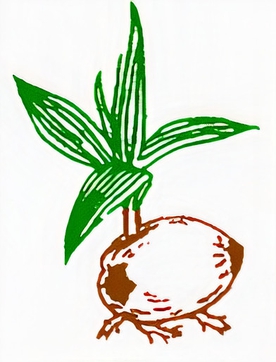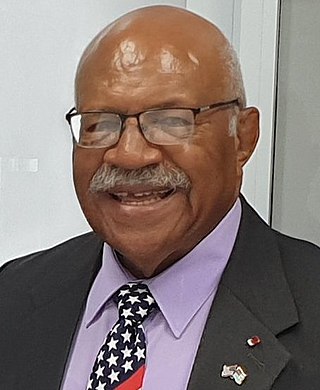Related Research Articles

Mahendra Pal Chaudhry is a Fijian politician and the leader of the Fiji Labour Party. Following a historic election in which he defeated the long-time former leader, Sitiveni Rabuka, the former trade union leader became Fiji's first Indo-Fijian Prime Minister on 19 May 1999, but exactly one year later, on 19 May 2000 he and most of his Cabinet were taken hostage by coup leader George Speight, in the Fiji coup of 2000. Unable to exercise his duties, he and his ministers were sacked by President Ratu Sir Kamisese Mara on 27 May; Mara intended to assume emergency powers himself but was himself deposed by the military leader, Commodore Frank Bainimarama.

The Fiji Labour Party, also known as Fiji Labour, is a political party in Fiji. Most of its support is from the Indo-Fijian community, although it is officially multiracial and its first leader was an indigenous Fijian, Dr. Timoci Bavadra. The party has been elected to power twice, with Timoci Bavadra and Mahendra Chaudhry becoming prime minister in 1987 and 1999 respectively. On both occasions, the resulting government was rapidly overthrown by a coup.

The United Fiji Party was a political party in Fiji. It was founded in 2001 by Prime Minister Laisenia Qarase as a power base; it absorbed most of the Christian Democratic Alliance and other conservative groups, and its endorsement by the Great Council of Chiefs (Bose Levu Vakaturaga) caused it to be widely seen as the successor to the Alliance Party, the former ruling party that had dominated Fijian politics from the 1960s to the 1980s. It drew its support mainly from indigenous Fijiians.

Sitiveni Ligamamada Rabuka is a Fijian politician, former soldier and former sportsman who has served as Prime Minister of Fiji since 24 December 2022. He was the instigator of two military coups in 1987. He was democratically elected as Prime Minister of Fiji, serving from 1992 to 1999, and again in 2022, leading a three-party coalition. He also served as Chairman of the Great Council of Chiefs from 1999 to 2001, and later as Chairman of the Cakaudrove Provincial Council from 2001 to 2008.

Tupeni Lebaivalu Baba is a Fijian academic, politician, and former Cabinet Minister. A founding member of the Fiji Labour Party, he served as a Cabinet Minister in the government of Timoci Bavadra until removed from office by the 1987 Fijian coups d'état, and then as Deputy Prime Minister of Fiji in the government of Mahendra Chaudhry until removed from office by the 2000 Fijian coup d'état. After splitting with Choudhry in the wake of the coup, he founded the New Labour Unity Party to contest the 2001 election, but failed to win a seat in Parliament. He unsuccessfully attempting to re-enter politics at the 2006 election under the banner of the Soqosoqo Duavata ni Lewenivanua, and again at the 2014 election as part of the Social Democratic Liberal Party.
Lekh Ram Vayeshnoi, is a Fijian politician of Indian descent. He was one of the youngest members to be elected into Parliament in 1992. He has represented the Nadroga Indian Communal Constituency, which he won for the Fiji Labour Party (FLP) in the parliamentary elections of 1992, 1994, 1999, 2001, and 2006. After the 1999 election he was appointed Assistant Minister in Prime Minister's Office. He was appointed Minister for Youth and Sports and Employment Opportunities in the interim administration that followed the military coup that took place on 5 December 2006. He was born to a family of Rajasthani descent.
Dr Gunasagaran Gounder is a Fiji Indian medical doctor who, as a Fiji Labour Party candidate, defeated the Leader of Opposition, Jai Ram Reddy of the National Federation Party, in the contest for the Yasawa Nawaka Open Constituency seat in the 1999 general election. He was subsequently appointed Assistant Minister for Health in the Peoples Coalition Government led by Mahendra Chaudhry from 1999 to 2000.
Amjad Ali is a Fiji Indian politician. In the House of Representatives he represented the Nadi Urban Indian Communal Constituency, one of 19 reserved for Indo-Fijians, from 1999 to 2006, having held the seat for the Fiji Labour Party (FLP) in the general elections of 1999 and 2001. At the 2006 general election, he transferred to the Nadi Open Constituency and held it for the FLP.
Ragho Nand is a Fiji Indian former politician who was also a Minister in the multi-party cabinet following the 2006 election.
Anand Babla was a Fijian politician of Indian descent. He was a member of the National Farmers Union and Fiji Labour Party (FLP), holding the Tavua constituency from 1992 to 2006. in the House of Representatives. He won the seat in the general elections of 1992, 1994, 1999, 2001 and 2006.
Attar Singh is an Indo-Fijian trade unionist. From 2002 to 2018 he was General Secretary of the Fiji Islands Council of Trade Unions (FICTU), one of two major umbrella bodies for trade unions in Fiji.
Chaitanya Lakshman is a Fiji Indian lawyer, social worker and politician who served in the multi-party cabinet of the Qarase Government as Minister for Local Government.
Ami Chand is a Fiji Indian politician who won the Ba West Indian Communal Constituency, one of the 19 seats reserved for Fiji citizens of Indian origin, for the Fiji Labour Party during the 1999 elections for the House of Representatives.
Muthu Swamy is a Fiji Indian politician who won the Labasa Indian Communal Constituency, one of the 19 seats reserved for Fiji citizens of Indian origin, for the Fiji Labour Party during the 1999 elections for the House of Representatives.
Mohammed Latif Subedar is a Fiji Indian politician who won the Labasa Rural Indian Communal Constituency, one of the 19 seats reserved for Fiji citizens of Indian origin, for the Fiji Labour Party during the 1999 election and the 2001 election for the House of Representatives.
Vinod Chandra Deo Maharaj is a Fiji Indian politician who won the Vuda Indian Communal Constituency, one of the 19 seats reserved for Fiji citizens of Indian origin, for the Fiji Labour Party (FLP) during the 1999 elections for the House of Representatives.
John Ali is a Fiji Indian politician who won the Nasinu Rewa Open Constituency, one of the 25 open seats, for the Fiji Labour Party during the 1999 elections for the House of Representatives.